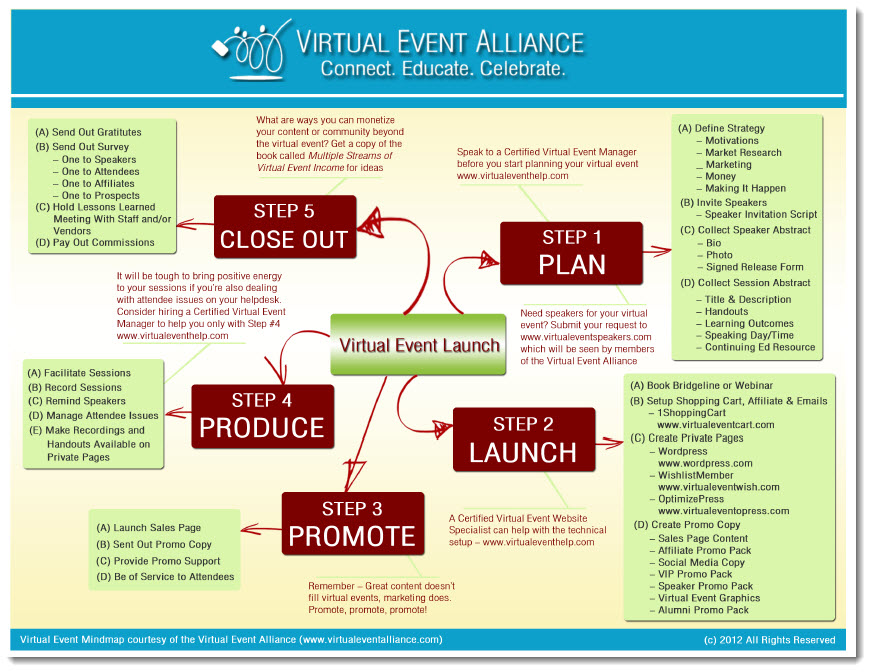In 2008, I hosted what was at the time the very first virtual event on the topic of social media. Thirty-three sessions, 36 speakers over 8-days.
Since then, everyone and their mama has launched a virtual event on the topic of social media.
My coach at the time encouraged me to go for it (it was originally called the Podcasting Telesumimt, but he strongly suggested I switch it to the Social Media Telesummit).
My friend and telesummit pioneer, Milana Leshinsky, gave me a virtual hug and loads of advice on how to get it done right.
The sales page went up, the promotions began and both registrations and negative feedback started to pour in.
This happened 3-years ago, however, the blog posts mocking the Social Media Telesummit still exist today (you can find them by reading my blog post called When People Mock You, You Know You’re Doing Something Right).
Hosting a virtual event is exciting. Anyone who can organize all the details to launch a virtual event has accomplished something big.
However, if your inbox isn’t blowing up with snarky comments about how much you’re damaging your industry by hosting a virtual event, it means that your virtual event is just a carbon copy of someone who has already forged that path for you.
Now, if you’re getting negative comments from those who have registered for your virtual event, that’s different. It means that you have unhappy customers. That’s different.
However, if prospects or leaders in your industry aren’t talking about your virtual event in a negative way, I’d be worried if I were you. It means that you’re not breaking new ground. You’re hosting a virtual event that looks, smells and acts the same as about a dozen of them out there that went before you.
So, what are the ways you can make your first (or next) virtual event stand out? What can you do to refresh the model so you ruffle a few feathers? Share your thoughts below.
(BTW, what’s really interesting about the negative feedback I got about the Social Media Telesummit is that one of the people who criticized it back in 2008 ended up speaking a virtual summit on the topic of social media just 2-years later. I won’t say who it is, but you can probably guess based on this blog post)


Gucci-sale mulberry-outlet-store mulberry-outlet mulberry-bags /mulberry-outlet hermes-belt mulberry-bags mulberry-outlet-store mulberry-outlet mulberry-outlet-store Burberry-Bags gucci-outlet-the-change hermes-belt Prada-Bags- Gucci-sale hermes-belt Prada-Bags hermes-birkin five-finger hermes-belt hermes-birkin mulberry-bags 5-finger-shoes hermes-belt dolphin/upload mulberry hermes-belt-material mulberry-outlet gucci-sale mulberry-factory Prada-Outlet mulbery-bags-an-ordinary -mulbery-bags Prada-Sunglasses hermes-birkin public/blog Prada-Bags Burberry-Bags hermes-birkin mulberry-outlet Gucci-sale Gucci-sale mulberry-outlet http://www.burberryoutlet4s.com/news/20110428142446.html
http://www.mulberrybagsonline.com/news/20110428131333.html
http://www.myhermesbirkin.com/news/20110428143311.html
Great post, Leesa! I love the way you deal directly with reality of negative comments. It’s a fact that they are going to happen, especially when you are breaking new ground, or shaking up the “tried and true”. In my experience the impetus of negative comments is rarely personal – instead it’s reaction to change or different approaches that challenges some folks in a way they find foreign to how they see things. And every so often, there’s just a little bit of “I wish I had thought of this first” that sneaks in there.
You are a trailblazer, Leesa. Thanks for that! P.S. your virtual event in ’08 was quite good and set the bar for the others that followed.